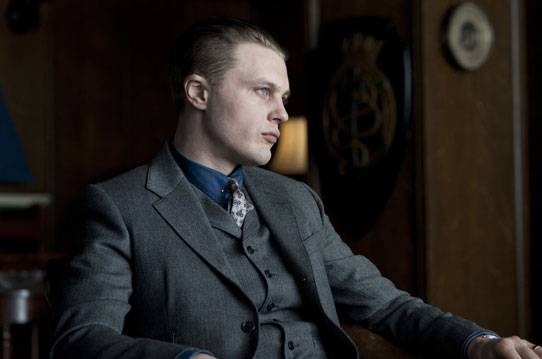I love so many things about "Boardwalk Empire": the writing, the cinematography, the casting, the suits, the pathos, a kinship between the grittiness of it's violence and stoicism of the characters and that of my favorite Westerns, the emotionless, unpredictable and creepy Nelson Van Alden, the extravagant "booze and broads" lifestyles enjoyed by the protagonists and the nod to real historical figures and other great mafia films and tv shows.
The writing intrigues and impresses with it's intense character psychologies and brutal portrayal of violence and the necessary role it plays in the lives the characters have chosen for themselves.
From a historical perspective, one can appreciate and admire the way they've boldly chosen to depict fictional representations of real historical figures; you can easily trace a line that allows you to follow the lives of some of the real-life gangsters portrayed in the series.
In terms of cinematic integrity, (because "Boardwalk" feels like cinema on the small screen), Scorsese's involvement legitimizes the venture and the involvement of greats actors like Steve Buscemi, Michael Kenneth Williams, Michael Pitt and Steven Graham all help realize the potential inherent in the script.
And the list of accolades would not be complete without a shout-out to the inimitable, unforgettable Richard Harrow.
All that being said, Jimmy Darmody, the quixotic, unforgiving, overly-ambitious ex-Doughboy, portrayed masterfully by Michael Pitt, was the one that always brought you back. More than any other character, he embodies that Western leading man aesthetic, that other-generation stoicism; one of the most engaging aspects of the show was wondering what was going on under the surface with Jimmy. Intense, ambitious, intelligent, his combat experience has left him almost incapable of feeling, a claim the violence he commits only serves to affirm.
His is a tragedy not unlike that of Anakin Skywalker/Darth Vader: he's brought up, afforded incredible advantages and instructed by Nucky Thompson, a superficially charming, though ultimately indifferent and avaricious political boss and a formidable mentor should your eventual destiny lie in organized crime.
Jimmy's destiny is to someday rule Atlantic City. He is an ambitious, merciless killer and at some points in the series, even appears to overtake Nucky. Unfortunately, he is too impetuous in addition to being emotionally crippled and while smart (and a quick learner), he is very unprepared for the untenable realities of the situation he creates for himself. Much like Anakin, he looses sight of himself in an effort to become someone he is not ready to be. His desire to provide for those he loves and live up to the example set out for him by his teacher furthers the similarity.
Finally, after messing up close to every decision he makes on his own, his transformation is complete and he becomes an actual monster, albeit with a guilty conscience and a desire to atone for his sins.
In the season finale, after so much violence and increased aggressiveness between the partners, Jimmy is stressed, overly-bold, frequently frustrated and ultimately apathetic or simply defeated and the entire weight of his actions seems to come crashing done on him as he approaches his end. Resigned to his fate, he choses death and creates his own terms for it, as he's tried to do when it comes to bootlegging, school and life. One could go so far as to say that he orchestrates his own death (and the circumstances surrounding it: providing for his son, making good on debts to Chalky, assuring that Nucky's trial would not progress) with greater passion and skill than any other venture he'd pursued on the show.
The final scene between Jimmy and Nucky is a morbidly brilliant moment: Nucky's will and his internal drive to impart it are never been more apparent. He dispassionately kills his protege, a young man he'd practically raised, that act juxtaposed with Jimmy's almost nonchalant familiarity with killing as he glibly quips, "Second time I didn't even think about it" and his resignation, bordering on relief at he thought of being killed. Palpable tension.
And then that final sting, when Jimmy practically goads Nucky into pulling the trigger: "All you gotta worry about is when you run outta booze and you run outta company and the only person left to judge you is you(r)..."
Jimmy's end is also an end to his suffering; again, like Vader, he was a limping, almost soulless half-man, haunted by the violence he'd both witnessed and participated in. We are able to imagine the conditions surrounding his "first death" during the elegiac flashback to the war, with Jimmy jumping over the trench into the fray, not looking back, on a field of broken, dead trees enshrouded in cloud and gun smoke. He was alone then and alone when Nucky killed him and both times, it was his decision, an attempt to escape from the awful considerations of his tortured mind.
http://www.youtube.com/watch?v=uEzfSGFgxew
("I can't believe they did it but I'm glad they did!" describes my reaction to Season 2 of "Boardwalk Empire". The finale was one of the greatest moments in recent TV history. I'm excited to see where it goes from here but will always wonder where it would have gone had Jimmy been a little more patient).



No comments:
Post a Comment